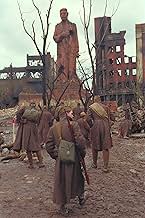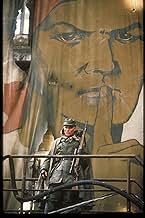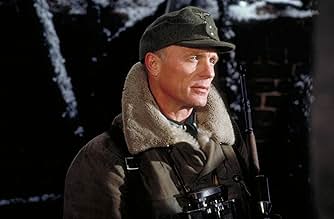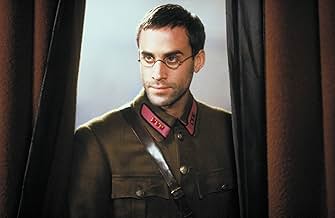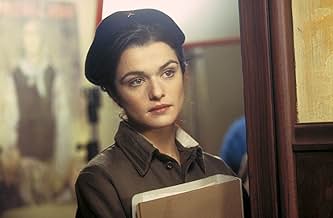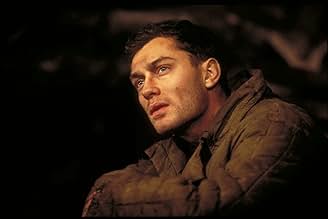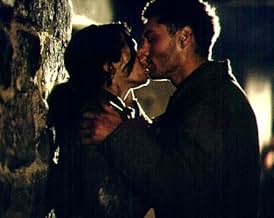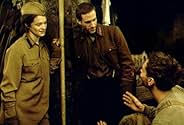A Russian and a German sniper play a game of cat-and-mouse during the Battle of Stalingrad.A Russian and a German sniper play a game of cat-and-mouse during the Battle of Stalingrad.A Russian and a German sniper play a game of cat-and-mouse during the Battle of Stalingrad.
- Director
- Writers
- Stars
- Awards
- 7 nominations total
Gabriel Thomson
- Sacha Filipov
- (as Gabriel Marshall-Thomson)
Hans-Martin Stier
- Red Army General
- (as Hans Martin Stier)
Clemens Schick
- German NCO
- (as Clemans Schick)
- Director
- Writers
- All cast & crew
- Production, box office & more at IMDbPro
7.5290.4K
1
2
3
4
5
6
7
8
9
10
Featured reviews
Tense war drama that centers the viewer in the German invasion of Stalingrad
I simply want to weigh in with a very positive response to Enemy at the Gates. Taken as a historical drama rather than an attempt to flawlessly depict an historical incident, this is topnotch entertainment. "Enemy" portrays the conflict between a young Russian sniper played by Law and the German sniper (Harris) who is sent to kill him during the German attack on Stalingrad during WWII. Apart from a scene which awkwardly caricatures the Russian field commanders and the occasionally distracting accents, the film successfully immerses the viewer in this tense war drama. Appreciate it it for its tight focus, uncompromising realism, and fine characterizations by the main actors. Research the historical accuracy later, if you must, but don't let it spoil the film.
A fascinating film about the strategy of two great snipers
In "Enemy at the Gates," the future of the greatest battle of World War II, would be decided between a young Russian sniper and an aristocratic sharpshooter from Germany sent to kill him
Jude Law and Ed Harris sit for hours waiting for the right moment
It was a duel set in the siege of Stalingrad
Stalingrad was one of the biggest and bloodiest battles of World War II, and in the midst of this huge battle, these two soldiers were hunting each other down
The film opens with the harrowing transport of thousand of Russian soldiers across the Volga River to Stalingrad The recruits were packed onto steamers, barges, whatever they could find to ferry them across the river All that under a deluge of shells, bombs and explosions
By the time Vassili arrives to Stalingrad, the Nazis have a distinct edge, and Soviet morale is at an all-time low
Leading the Russians in their seemingly futile defense is Nikita Kruschev, played by Bob Hoskins The Germans, at that time, were overrunning the place and the Russians were in an appalling state It was the most awful battle of the war
Joseph Fiennes plays Danilov, an idealistic Russian officer who passionately speaks about his belief in getting the troops to turn the grave situation in Stalingrad around He finds the perfect inspiration in Vassili
Rachel Weisz plays a young woman who volunteers to help in the war effort She's literally protecting the people she grew up with When she meets Vassili, he just has a natural intelligence, a natural instinct
Jude Law is remarkable as the young sharpshooter Vassili Zaitsev who conveyed both humanity and intensity There's such a fierce intelligence and liveliness in his eyes He can also be very quiet and internal Vassili found the complexity within the silence and stillness In fact to be a sniper is very much about a man of action through stillness Vassili represented the ultimate hero, the symbol of someone who could instill hope and belief in victory amongst the troops, because his skills as a sniper were unparalleled
Ed Harris played Major Konig, the German sharpshooter sent to hunt down Vassili He knows that Vassili was picking off German officers with some regularity, and was becoming a folk hero for the Russian soldiers as well as the Russian populace... He decided to eliminate him
The casting of Ed Harris opposite Jude Law resulted in a striking visual link between their characters They both have these unbelievably penetrating blue eyes And director Jean-Jacques Annaud began to see the duel through their eyes And one of the first shots of Ed Harris was a close-up of his blue eyes
Annaud painted the tensions very clearly and concentrated purely on the eyes of the Jude Law and Harris and, of course, on their rifles and how they were hidden and what they were doing Basically, the core of his camera is the duel of their eyes, duel of men, duel of snipers, therefore a confrontation of people that scan the surrounding buildings, and try to decipher what they see
The film opens with the harrowing transport of thousand of Russian soldiers across the Volga River to Stalingrad The recruits were packed onto steamers, barges, whatever they could find to ferry them across the river All that under a deluge of shells, bombs and explosions
By the time Vassili arrives to Stalingrad, the Nazis have a distinct edge, and Soviet morale is at an all-time low
Leading the Russians in their seemingly futile defense is Nikita Kruschev, played by Bob Hoskins The Germans, at that time, were overrunning the place and the Russians were in an appalling state It was the most awful battle of the war
Joseph Fiennes plays Danilov, an idealistic Russian officer who passionately speaks about his belief in getting the troops to turn the grave situation in Stalingrad around He finds the perfect inspiration in Vassili
Rachel Weisz plays a young woman who volunteers to help in the war effort She's literally protecting the people she grew up with When she meets Vassili, he just has a natural intelligence, a natural instinct
Jude Law is remarkable as the young sharpshooter Vassili Zaitsev who conveyed both humanity and intensity There's such a fierce intelligence and liveliness in his eyes He can also be very quiet and internal Vassili found the complexity within the silence and stillness In fact to be a sniper is very much about a man of action through stillness Vassili represented the ultimate hero, the symbol of someone who could instill hope and belief in victory amongst the troops, because his skills as a sniper were unparalleled
Ed Harris played Major Konig, the German sharpshooter sent to hunt down Vassili He knows that Vassili was picking off German officers with some regularity, and was becoming a folk hero for the Russian soldiers as well as the Russian populace... He decided to eliminate him
The casting of Ed Harris opposite Jude Law resulted in a striking visual link between their characters They both have these unbelievably penetrating blue eyes And director Jean-Jacques Annaud began to see the duel through their eyes And one of the first shots of Ed Harris was a close-up of his blue eyes
Annaud painted the tensions very clearly and concentrated purely on the eyes of the Jude Law and Harris and, of course, on their rifles and how they were hidden and what they were doing Basically, the core of his camera is the duel of their eyes, duel of men, duel of snipers, therefore a confrontation of people that scan the surrounding buildings, and try to decipher what they see
A joke, from both a historical and a cinematic points of view
First of all, I think it was a mistake for the screenwriters to pick and choose such a big event in the history of WWII, a turning point so to speak, only to have it placed as a background, to something so much less significant, a duel between two snipers. If one has never read anything historical or seen any chronological movies about battle of Stalingrad, or any other battle for that matter before seeing this movie, one might even wonder, how did Russians win the war at all? With one rifle per four hands? Against tanks? And aircraft? And heavy artillery? You know there's only so much even a drunken Russian can do with his ½ of a rifle. I see all these peoples' comments complaining that the main characters' accents were too British or too American and that that spoiled the true Russian Character, however the Hollywood makers portray that to be. But, being Russian myself, I saw nothing in the movie, at least on the Russian side, that resembled any truth to even how people spoke to each other, how they interacted with each other. They just didn't seem Russian to me, and it didn't matter what accents they used. These characters were biased cardboard characters, speaking cardboard character lines, and acting, well, cardboard-like. In the opening scenes of the movie they show a bunch of unarmed people thrown into battle only to be massacred by well armed Germans. That's a crock of sh*t, pardon my Russian. Basically by 1942, Hitler's army was fighting on two fronts, and it was very, very tired. Both sides were. Both sides were running out of people and supplies. Mostly, Battle of Stalingrad was a two-steps-forward-one-step-back kind of war. People charging and taking over some useless strategic point and then being thrown back, and then charging again. It was a battle to see who had a bigger stamina, because both sides were low in numbers. But it was also a battle involving tanks, artillery, and planes on BOTH sides. In the movie they omitted that, showing us diving Stukas, and yet surprisingly, no anti-aircraft guns firing at them, no Russian planes in the sky, just two soldiers armed with one rifle. Bullsh*t. No number of Vasiliy Zaycevs or Tatyana Whoevers would be able to stand off, and more even, reverse the tide of war against Germans, without having, basically an equally, if not better, equipped army at their side. If you look at the numbers, about 250,000 German and about 100,000 Russian soldiers lost their lives over Stalingrad. Well from the movie it might seem the opposite. Plus the whole mood of the movie. Russian soldiers, seemed no different from prisoners, defending Stalingrad only because of the muzzles pointed at their backs. But actually, believe it or not, many of these people were defending their motherland, their wives, daughters, sons, etc. and they were doing it not because they were to be shot otherwise, but because they loved their country and believed in its future. True, there were special NKVD units that were ordered to fire on retreating soldiers. But there was no other way, at that point. If Stalingrad would've fallen, that would greatly demoralize an entire Red Army, and cause an even greater loss of life. But by no means were soldiers thrown into battle, half-armed into their certain death. That would just be pointless, even for ruthless Russian Generals. Plus when they showed Kruschev commanding the front, I fell off my seat laughing. I can go on and on, and this would be a never-ending story, except that I don't want it to be as boring and as never-ending as the script for Enemy at the gates. Advice for people who like a little reality in their movies, don't see it. It sucks. I try to picture Private Ryan done by the same director. It just wouldn't be Private Ryan, but some stupid unrealistic war flick, sort of like U-571.
Stalingrad action pic only
Not a bad war film - but only if you know nothing about the actual battle. The film makers are entitled to take artistic license, and although some historical characters are present in the film, it never even comes close to portraying the battle as it was. Much of the fighting lacks reality and the computer generated Stuka dive bombers attacking reinforcements crossing the Volga are totally unrealistic.
The film takes a quick peek at several themes of the actual battle but explores none - including the character of Zaitsev himself, whose role in the battle was quite different from Law's character. It is worth mentioning that several other Russian snipers, in Stalingrad and elsewhere, killed many more Germans than Zaitsev. It is also amazing how many people believe that Konig is based on a real character called Hartmann, A good tale, but untrue. Still, its a decent film, but the real Stalingard epic has yet to be made
The film takes a quick peek at several themes of the actual battle but explores none - including the character of Zaitsev himself, whose role in the battle was quite different from Law's character. It is worth mentioning that several other Russian snipers, in Stalingrad and elsewhere, killed many more Germans than Zaitsev. It is also amazing how many people believe that Konig is based on a real character called Hartmann, A good tale, but untrue. Still, its a decent film, but the real Stalingard epic has yet to be made
Brilliant war epic
All in all a brilliant war epic and a totally gratifying 2 hour plus experience.
Fantastic depiction of the bleak situation in Stalingrad,fantastic music,fantastic sniper scenes,great acting.
It might be a little bit flawed in the depiction of the Russian idiosyncracy,as all Western depictions unavoidably are because they are addressing western audiences.
Nevertheless the cat and mouse game between Zaitchev and his German counterpart are nothing short of outstanding and engaging.
It is touching,too,watching all the future acting stars at their,more or less,beginnings. Very appetizing appearances. The elder statesmen,as Ed Harris, are brilliant as usual.
Highly recommended!!!
Fantastic depiction of the bleak situation in Stalingrad,fantastic music,fantastic sniper scenes,great acting.
It might be a little bit flawed in the depiction of the Russian idiosyncracy,as all Western depictions unavoidably are because they are addressing western audiences.
Nevertheless the cat and mouse game between Zaitchev and his German counterpart are nothing short of outstanding and engaging.
It is touching,too,watching all the future acting stars at their,more or less,beginnings. Very appetizing appearances. The elder statesmen,as Ed Harris, are brilliant as usual.
Highly recommended!!!
Did you know
- GoofsIn the scene where Vassili is lighting the cigarette butt he picked up from the German sniper, it's apparent by the flame he uses a butane lighter. Butane lighters were not invented until the 1950's.
- Quotes
Commisar Danilov: I've been such a fool, Vassili. Man will always be a man. There is no new man. We tried so hard to create a society that was equal, where there'd be nothing to envy your neighbour. But there's always something to envy. A smile, a friendship, something you don't have and want to appropriate. In this world, even a Soviet one, there will always be rich and poor. Rich in gifts, poor in gifts. Rich in love, poor in love.
- Crazy creditsThe end credits are slanted and curved.
- SoundtracksLa Chanson des Artilleurs
Music by Tikhon Khrennikov
Lyrics by Viktor Gusev
(C) Musikvertag Hans Sikorski, Hamburg
Performed by The Red Army Choir (as Les Choers De L'Armee Rouge)
Courtesy of 7 Productions, Paris
- How long is Enemy at the Gates?Powered by Alexa
Details
- Release date
- Countries of origin
- Official sites
- Languages
- Also known as
- Enemigo al acecho
- Filming locations
- Production companies
- See more company credits at IMDbPro
Box office
- Budget
- $68,000,000 (estimated)
- Gross US & Canada
- $51,401,758
- Opening weekend US & Canada
- $13,810,266
- Mar 18, 2001
- Gross worldwide
- $96,976,270
- Runtime
- 2h 11m(131 min)
- Color
- Sound mix
- Aspect ratio
- 2.35 : 1
Contribute to this page
Suggest an edit or add missing content


